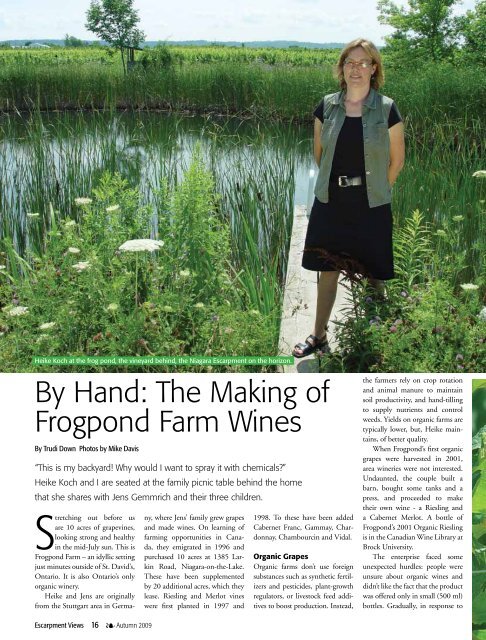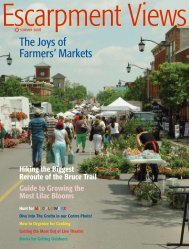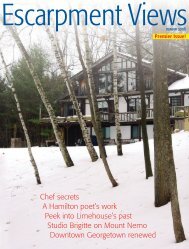Autumn 2009 EV
Create successful ePaper yourself
Turn your PDF publications into a flip-book with our unique Google optimized e-Paper software.
Heike Koch at the frog pond, the vineyard behind, the Niagara Escarpment on the horizon.<br />
The vintners’ hands: Heike and Jens Gemmrich examine the grapes.<br />
By Hand: The Making of<br />
Frogpond Farm Wines<br />
By Trudi Down Photos by Mike Davis<br />
“This is my backyard! Why would I want to spray it with chemicals?”<br />
Heike Koch and I are seated at the family picnic table behind the home<br />
that she shares with Jens Gemmrich and their three children.<br />
Stretching out before us<br />
are 10 acres of grapevines,<br />
looking strong and healthy<br />
in the mid-July sun. This is<br />
Frogpond Farm – an idyllic setting<br />
just minutes outside of St. David’s,<br />
Ontario. It is also Ontario’s only<br />
organic winery.<br />
Heike and Jens are originally<br />
from the Stuttgart area in Germany,<br />
where Jens’ family grew grapes<br />
and made wines. On learning of<br />
farming opportunities in Canada,<br />
they emigrated in 1996 and<br />
purchased 10 acres at 1385 Larkin<br />
Road, Niagara-on-the-Lake.<br />
These have been supplemented<br />
by 20 additional acres, which they<br />
lease. Riesling and Merlot vines<br />
were first planted in 1997 and<br />
1998. To these have been added<br />
Cabernet Franc, Gammay, Chardonnay,<br />
Chambourcin and Vidal.<br />
Organic Grapes<br />
Organic farms don’t use foreign<br />
substances such as synthetic fertilizers<br />
and pesticides, plant-growth<br />
regulators, or livestock feed additives<br />
to boost production. Instead,<br />
the farmers rely on crop rotation<br />
and animal manure to maintain<br />
soil productivity, and hand-tilling<br />
to supply nutrients and control<br />
weeds. Yields on organic farms are<br />
typically lower, but, Heike maintains,<br />
of better quality.<br />
When Frogpond’s first organic<br />
grapes were harvested in 2001,<br />
area wineries were not interested.<br />
Undaunted, the couple built a<br />
barn, bought some tanks and a<br />
press, and proceeded to make<br />
their own wine - a Riesling and<br />
a Cabernet Merlot. A bottle of<br />
Frogpond’s 2001 Organic Riesling<br />
is in the Canadian Wine Library at<br />
Brock University.<br />
The enterprise faced some<br />
unexpected hurdles: people were<br />
unsure about organic wines and<br />
didn’t like the fact that the product<br />
was offered only in small (500 ml)<br />
bottles. Gradually, in response to<br />
Heike shows a pheromone strip that confuses harmful<br />
moths and reduces their reproduction.<br />
the launch of a website and profiles<br />
in newspapers and magazines,<br />
people started visiting the farm.<br />
The natural next step was to build<br />
a small shop and obtain a licence<br />
to retail on site.<br />
Frogpond wines were certified<br />
in 2007 through Pro-Cert<br />
Organic Systems (formerly Pro-<br />
Cert Canada), Canada’s foremost<br />
national certifier of organic food<br />
products.<br />
Frogpond uses aged manure<br />
and refrains from over-fertilizing<br />
the soil. Kelp is also applied to<br />
help strengthen the vines. To avoid<br />
using synthetic fungicides or insecticides,<br />
the farm tries to attract<br />
a variety of insects by encouraging<br />
different kinds of plants and flowers.<br />
Weeding is done by hand, using<br />
a grape hoe. Yield varies from<br />
year to year: the 30 acres produce<br />
approximately 60 to 90 tonnes<br />
of grapes, which are made into<br />
35,000 to 50,000 litres of wine.<br />
Harvesting is done by hand<br />
because heavy machinery would<br />
compact the soil. One advantage<br />
of this is that pickers can be selective,<br />
avoiding grapes that are<br />
not yet ripe or that show signs of<br />
fungus. After being crushed and<br />
de-stemmed, the grapes go into<br />
fermentation tanks where they are<br />
left until the juice clears naturally.<br />
Red wine is aged in oak casks for<br />
about a year. All wines receive<br />
only one filtration process prior<br />
to bottling. Frogpond does not<br />
use preservatives, fining agents or<br />
additives in the winemaking process.<br />
If the wine needs stabilizing,<br />
a natural product such as organic<br />
egg white is used.<br />
But, as Heike notes, “If nothing<br />
is going wrong, we don’t do anything.<br />
We simply wait.” A tiny bit<br />
Escarpment Views 16 ❧ <strong>Autumn</strong> <strong>2009</strong> ❧ <strong>Autumn</strong> <strong>2009</strong> 17 Escarpment Views
















